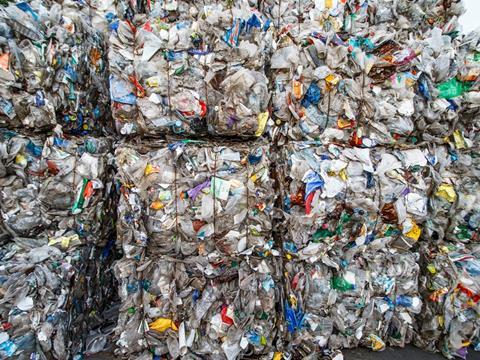
Twenty associations from across the plastics supply chain – including EuPC, CEFLEX, EUROPEN, and Der Grüne Punkt – have signed a letter calling upon EU Member States to utilize mass balance fuel-use exempt in a harmonized mass balance approach for allocating chemically recycled content.
With a previous report from the European Commission warning that multiple Member States could miss their recycling targets by 2025 – and Eurostat calculating in 2022 that the EU plastics recycling rate was at 38% as opposed to the 2025 target of 50% – the letter identifies a ‘critical need’ for increased investment in recycling and collection infrastructure.
As mandatory recycled content targets for both packaging and automotive fields are being discussed at EU level, the signatories assert that chemical recycling could complement existing efforts to increase volumes of recycled content. Academic research indicates that mechanical, other physical, and chemical recycling work in collaboration to address different types of feedstocks in plastic production.
The letter highlights that, when chemically recycled feedstocks are blended with virgin feedstocks, the results are co-fed into complex large-scale installations and cannot be physically separated from one another. As such, a mass balance chain of custody can be used to calculate and verify the amount of recycled content to be allocated to each product.
Chemical recycling is in the midst of a rapid development process, says the European Commission’s Joint Research Centre, and is already thought to reduce greenhouse gases when compared to incineration with energy recovery. This is expected to increase as the EU electricity grid undergoes further decarbonization.
According to the signatories, mass balance fuel-use exempt is an important facet of rapidly scaling up chemical recycling, as an estimated investment of €8 billion by 2030 – which is anticipated to produce 2.8Mt of chemically recycled plastics across the Member States – is not thought to be possible without a mass balance method that incentivizes growth.
They add that the definition of recycling in the Waste Framework Directive aligns with the mass balance fuel-use exempt approach and encourage third-party certification and auditing systems to track recycled content throughout the supply chain. Similar systems are currently used in chemical recycling to facilitate full chain of custody traceability for the commercialized products.
Methods like polymer only and proportional allocation are thought to drive up costs and the chemical recycling capacity required to reach recycled content targets.
Earlier this year, organisations from various major market sectors requested that the European Commission and Member States utilize mass balance to develop EU-harmonised calculating rules and meet revised environmental targets in the process.
Similarly, a position paper from the Renewable Carbon Initiative has pushed for a mass balance framework for chemical recycling streams, amongst other calls to action. This is thought to be important for tracing recycled materials across the value chain.
If you liked this article, you might also enjoy:
The L’Oréal approach to packaging sustainability
What steps is Apple taking to make its packaging more sustainable?
How did Brazil achieve its 100% aluminium can recycling rate – and can it be replicated in the EU?
Experts have their say on the EU’s Packaging and Packaging Waste Directive revisions













No comments yet